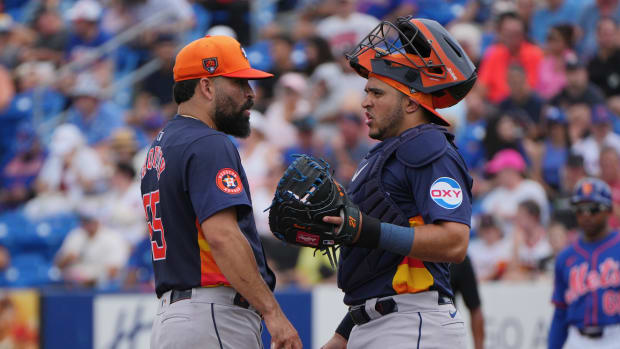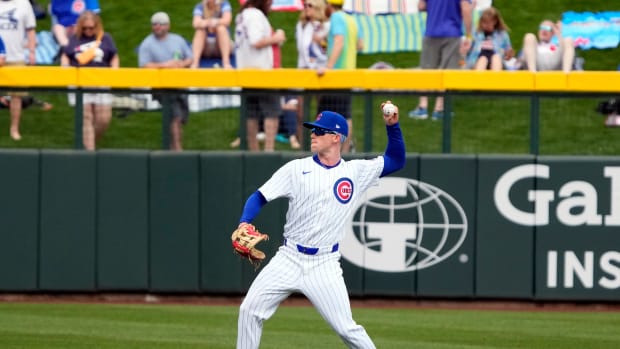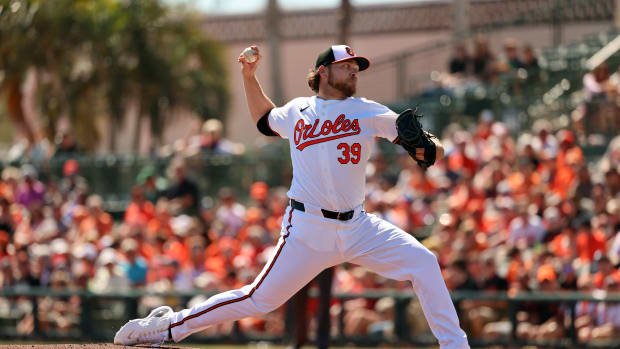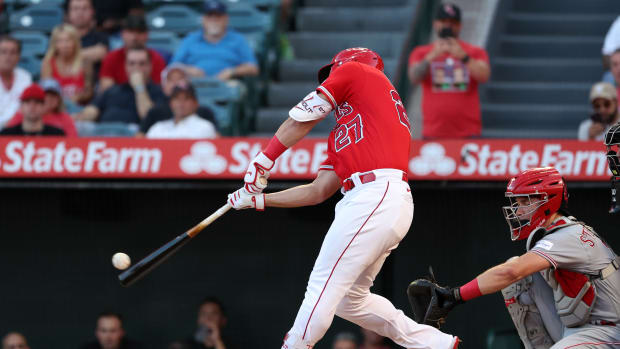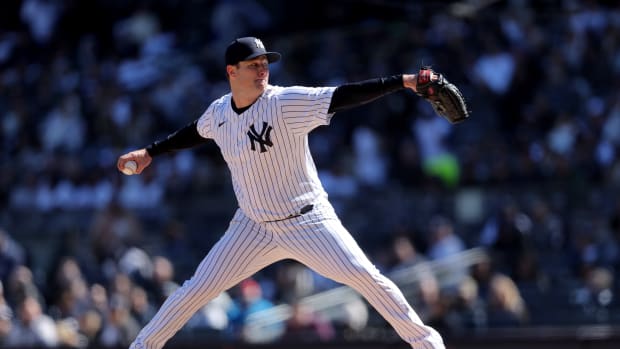Wieters struggling but hope -- and hype -- live on in Baltimore
BALTIMORE -- As perhaps the most revered Baltimore Oriole in history, Cal Ripken Jr. remembers well what it took to get there. But before he was a Baltimore icon, before he was an Iron Man, even before he was an established big leaguer, Ripken was a 21-year-old rookie mired in a horrific slump and unsure of how to get out of it.
During one three-week stretch at the start of the 1982 season, Ripken went 4 for 55, a slump he still recalls vividly even though he's forgotten exactly how many different people tried to give him advice on how to break it.
"I had everybody telling me how to hit," Ripken says. "Including the bat boy, including the clubhouse guys and everybody else. Pitching coaches, even, and other players. You have to determine who you listen to. That's all maturation and the learning process."
Ripken emerged from that slump just fine. He wound up as the AL Rookie of the Year and followed it up with an MVP the next season while leading the Orioles to their most recent world championship. By that time, it's safe to assume that his rookie slide had long been forgotten by nearly everyone but him.
That's also why Ripken isn't particularly concerned about the Orioles' latest prodigy, second-year switch-hitting catcher Matt Wieters. A figure of hope for the future of a franchise that hasn't had a winning season since 1997, Wieters has endured lingering sophomore struggles that have symbolized the regression of a young core once thought to be the saving grace in Baltimore.
That group includes 2009 All-Star Adam Jones, outfielder Nick Markakis and pitcher Brian Matusz, but no player is more important to the organization than Wieters, and thus no player's struggles are more concerning to its fans. Since being selected fifth overall in the 2007 draft, Wieters has been compared to past and present catching greats such as future Hall of Famer Mike Piazza and reigning AL MVP Joe Mauerand landed on the cover of Sports Illustrated in March with the billing "The Perfect Catch." Yet in 267 at-bats this season, Wieters has hit just .243 with six home runs and 29 RBIs as Baltimore has limped to a major league-worst 25-59 start.
"A lot of people thought he was going to be an instant star," Orioles hitting coach Terry Crowley says. "I might've been guilty of that also."
Crowley wasn't the first to feel that way. Wieters had been a standout baseball player while growing up in South Carolina as the son of a former minor league pitcher. Whit Robbins, a teammate of Wieters' at Georgia Tech, remembers that Wieters had a "Baseball is Life" sticker on the back of his car as he drove up to a Yellow Jackets' practice, and Robbins thought he had met a kid meant for something more than just the college game. Wieters became a two-time All-America with the Yellow Jackets who not only batted .360 with 35 homers and 198 RBIs in 185 games, but also recorded 16 saves and posted a 3.83 ERA. Wieters' talent was so overwhelming that he was given a nickname from his teammates. Simply, they called him "God."
"We would kid around with him and call him that," says former Robbins, who is now in the Minnesota Twins' system. "But sometimes, he would kind of be God. It was pretty incredible to see him go in there and close the game after he caught eight innings. It's hard for one guy to dominate a baseball game, but he did it."
Wieters did it in the minors, too, batting .355 with 27 home runs and 91 RBIs in 2008, his first professional season, and then .305 in 2009 before he was finally promoted to the majors. By then the hype in Baltimore was in full bloom. It was the hype that came with Wieters being proclaimed the No. 1 prospect in the country before the 2009 season by Baseball America. The hype that came with seeing Wieters skyrocket through the minor leagues in just 169 games. The hype that came with a debut that was announced three days in advance. That hype turned to hope in the form of 42,704 fans in the seats at Camden Yards for his May 29 debut in which he went 0 for 4 in a 7-2 Orioles win over the Tigers.
Both the hype and the hope continued to grow as Wieters finished an abbreviated rookie season at .288, with nine homers and 43 RBIs in 354 at-bats.
Wieters deflects the anticipation that came with the results in his first year. "You just have to have your own expectations," he says. "You just have to try to work hard and live up to the expectations you have for yourself and the ability you feel you have."
Those expectations made Wieters' struggles this season even more of a concern. Wieters was batting .289 on May 3, but by mid-June he had bottomed out at .222 after a 37-game stretch that included just six RBIs.
Wieters has been working with Crowley to shorten his swing. "There is still a lot of work and learning to be done," says Crowley.
Wieters says the harder part is the mental adjustments that come with the grind of a prolonged slump. "The big thing is to not worry about what happened in your last at bat," Wieters says. "You're always 0 for 0 when you go up to the plate, no matter whether you've had four hits that day or have zero hits in a month."
Adds Orioles' center fielder Adam Jones of Wieters' struggles, "A lot of it is mental in baseball. Because it's a game of failure. How certain people handle failure is different than how most people do it. In the sporting world, you've got stress, you've got the fans beating down on you."
With Wieters' and the Orioles' struggles, the 40,000-plus fans are no more, and Wieters has even begun to hear boos at Camden Yards. But the hope still lives, as is evident among the 21,392 faithful who attended the June 30 game against the A's on Matt Wieters Bobblehead Night.
When Wieters ended a long at-bat by singling sharply to left field, the same fans who had heckled him just a few innings before for striking out on a pitch in the dirt now gave him an ovation suited for something bigger than a seventh-inning single with two out and no one on-base.
Perhaps the reaction is because the hope has been growing recently. Wieters has a hit in 12 of his past 14 games through Wednesday, to raise his average to .243. It's evident within his team as well. Amidst a rather bleak locker room that comes with being 28 games out of first place, Jones flashes optimism when discussing his teammate.
"The big leagues [aren't] easy. If it was easy, everybody would be doing it," Jones says. "It's a challenge amongst himself that he has to do. He has to take on the challenge. Personally, I think, and I think everybody in here thinks, he's going to be a hell of a player. I think that he's a hell of a player right now. Obviously, he's young, but I think he's going to be a beast in this league."
Wieters can find further comfort in someone who's been there before. Ripken still looks back at his rookie year slump as an instrumental part of his growth and maturation in his debut season. Eventually, he thinks that when Wieters is past the comparisons and past the hype, he'll look at it the same way.
"It's unfair, because you're looking at the guy's potential," the Hall of Famer says. "The expectations shouldn't be that high. You should let him evolve and let him develop into the player he's going to be. I think with the talent that he has, he's going to develop into a really good catcher and a really good hitter in the big leagues. Sometimes, you want to push that and make it happen faster than it should. All it takes for him is to build confidence and to put two [strong] weeks together, and his numbers will look completely different."
The Orioles and their dwindling but still passionate fan base can only hope so.
































